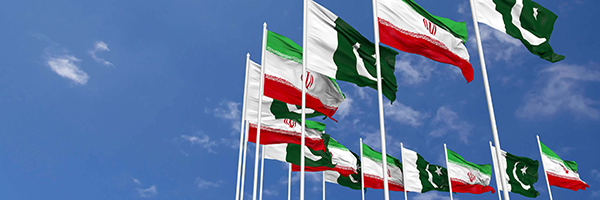 The Cradle, January 19, 2024 —
The Cradle, January 19, 2024 —
Pakistani and Iranian officials are working to cool tensions following a series of cross-border strikes between the two states.
Pakistan officially moved to restore all diplomatic ties with Iran on 19 January after a brief diplomatic row as both sides fired missiles into each other’s lands.
“The apex security committee has decided to restore full diplomatic ties with Tehran, including sending back the ambassador, as both sides agreed to de-escalate the situation after retaliatory strikes,” local media reported.
Iranian Foreign Minister Hossein Amir-Abdollahian also spoke over the phone with his Pakistani counterpart, Jalil Abbas Jilani, telling him that “Pakistan is of high importance in Iran’s foreign policy.”
For his part, Jilani expressed Islamabad’s “readiness to work with Iran on all issues based on the spirit of mutual trust and cooperation” and urged for ”closer cooperation on security issues.”
“Pakistan and Iran have fraternal relations and shall move forward to resolve all issues through positive dialogue. It is important to restore trust and confidence that has always defined our bilateral relations. Our common challenges, including terrorism, require coordinated action,” Pakistan’s Additional Foreign Secretary, Rahim Hayat Qureshi, said via social media on 18 January, addressing Iranian diplomat Rasoul Mousavi.
Via his account, Mousavi said that tensions between the two countries are at an “endpoint,” adding that “leaders and high officials of both countries know that only terrorists and enemies of both countries benefit from the existing tension between” Pakistan and Iran.
Pakistani jets launched airstrikes on Iran’s Sistan and Baluchestan province on 18 January, targeting separatist militants operating on the Iranian side of the border.
“This morning, Pakistan undertook a series of highly coordinated and specifically targeted precision military strikes against terrorist hideouts in the Siestan-o-Baluchistan province of Iran. Several terrorists were killed during the Intelligence-based operation codenamed Marg Bar Sarmachar,” the Pakistani Foreign Ministry said.
The strikes targeted the Baloch Liberation Front (BLF), also referred to as Sarmachar, a separatist group seeking autonomy in the Pakistani province of Balochistan, which has been engaged in a guerrilla insurgency against Pakistani authorities for decades.
The strikes appeared to be in response to the series of Iranian airstrikes launched on Pakistan on the night of 16 January, targeting what Tehran said was the headquarters of the Jaish al-Adl extremist group.
Civilians were killed in both the Iranian and Pakistani strikes.
Jaish al-Adl is responsible for several attacks on southeast Iran, including one last month, which killed 11 Iranian police officers in the town of Rask.
On 17 January, Iran’s Foreign Minister Hossein-Amir Abdollahian accused the group of being linked to Israel.
Formerly known as Jundallah, the group has long-standing ties to Western intelligence agencies. ABC News reported in 2007 that, according to unnamed US and Pakistani intelligence sources, the group has been “secretly encouraged and advised” by the US government since 2005.
Extremist groups and separatist militias have long operated on both sides of the porous border between the two nations. While tensions exist due to the presence of such organizations, further escalation is not expected.
